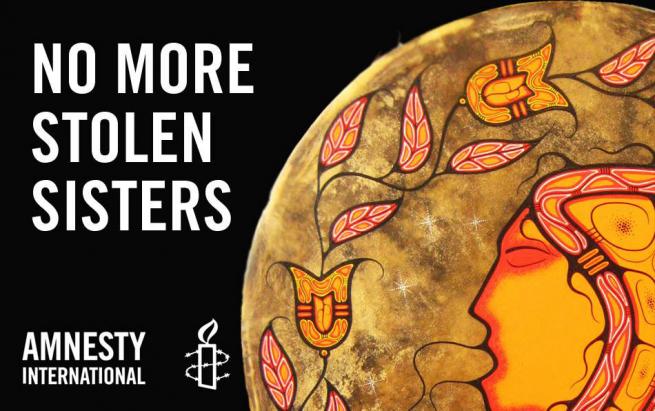Indigenous women, girls, and two-spirit people in Canada experience staggeringly high levels of violence, and for decades, government failed to acknowledge and address this human rights crisis. Indigenous women’s organizations, grassroots activists, violence survivors, and the families and loved ones of missing and murdered Indigenous women, girls, and two-spirit people long called for a national inquiry to compel government to investigate and take urgent action to end the violence. Amnesty International advocated alongside Indigenous partners in calling for a national inquiry.
In 2015, the federal government agreed to call for a national commission of inquiry, and in 2016 the National Inquiry into Missing and Murdered Indigenous Women and Girls commenced its work. Amnesty International was a Party with Standing to the National Inquiry. We participated in two Inquiry hearings, testified as a witness on the findings of our Out of Sight, Out of Mind research into the intersection of gender, Indigenous rights, and energy development in northeast British Columbia, and we made final oral and written submissions to the Inquiry before it concluded its work.
On June 3, 2019, Amnesty International was honoured to be present at a ceremony where the National Inquiry into Missing and Murdered Indigenous Women and Girls released its final report, Reclaiming Power and Place. The 1,200 page report, executive summary, and supplementary reports on Quebec and on genocide, culminate in 231 Calls for Justice.
In response to the report, Amnesty International called on all governments in Canada to move beyond the piecemeal approach to ending the violence that has tragically failed First Nations, Inuit, and Métis women, girls, two-spirit people, families, and communities.
Amnesty International welcomed the Inquiry’s call for a National Action Plan on violence against Indigenous women, girls and two-spirit persons as a way to move beyond a piecemeal government response to comprehensive action, and were pleased that the federal government accepted this recommendation.
We particularly welcomed the Inquiry’s inclusion of a section on “Resource Extraction and Violence Against Indigenous Women,” which heavily referenced Amnesty International’s research on this issue and led to five strong Calls for Justice to recognize and address violence associated with resource development projects, including industry labour camps.
What can you do now?
Read the National Inquiry’s final report including the 231 Calls for Justice. The Calls for Justice make strong recommendations to government, police, and institutions like the media and healthcare sectors to take urgent action. They also include specific Calls for Justice to all people in Canada.
In particular, please read the eight Calls for Justice addressed to every person in Canada. Read them, share them with your family, friends, colleagues, and fellow activists. Please respectfully engage in difficult discussions about how the structures and institutions of Canadian society with which we engage, and from which many of us benefit, put Indigenous women, girls, and two-spirit people in harm’s way or deny them justice. We all have a role to play and a responsibility in making sure that Indigenous women, girls, and two-spirit people can live in safety and dignity, free from violence and discrimination.
Here are the eight Calls for Justice for every person in Canada:
As this report has shown, and within every encounter, each person has a role to play in order to combat violence against Indigenous women, girls, and 2SLGBTQQIA people. Beyond those Calls aimed at governments or at specific industries or service providers, we encourage every Canadian to consider how they can give life to these Calls for Justice. We call on all Canadians to:
15.1 Denounce and speak out against violence against Indigenous women, girls, and 2SLGBTQQIA people.
15.2 Decolonize by learning the true history of Canada and Indigenous history in your local area. Learn about and celebrate Indigenous Peoples’ history, cultures, pride, and diversity, acknowledging the land you live on and its importance to local Indigenous communities, both historically and today.
15.3 Develop knowledge and read the Final Report. Listen to the truths shared, and acknowledge the burden of these human and Indigenous rights violations, and how they impact Indigenous women, girls, and 2SLGBTQQIA people today.
15.4 Using what you have learned and some of the resources suggested, become a strong ally. Being a strong ally involves more than just tolerance; it means actively working to breakdown barriers and to support others in every relationship and encounter in which you participate.
15.5 Confront and speak out against racism, sexism, ignorance, homophobia, and transphobia, and teach or encourage others to do the same, wherever it occurs: in your home, in your workplace, or in social settings.
15.6 Protect, support, and promote the safety of women, girls, and 2SLGBTQQIA people by acknowledging and respecting the value of every person and every community, as well as the right of Indigenous women, girls, and 2SLGBTQQIA people to generate their own, self-determined solutions.
15.7 Create time and space for relationships based on respect as human beings, supporting and embracing differences with kindness, love, and respect. Learn about Indigenous principles of relationship specific to those Nations or communities in your local area and work, and put them into practice in all of your relationships with Indigenous Peoples.
15.8 Help hold all governments accountable to act on the Calls for Justice, and to implement them according to the important principles we set out.













